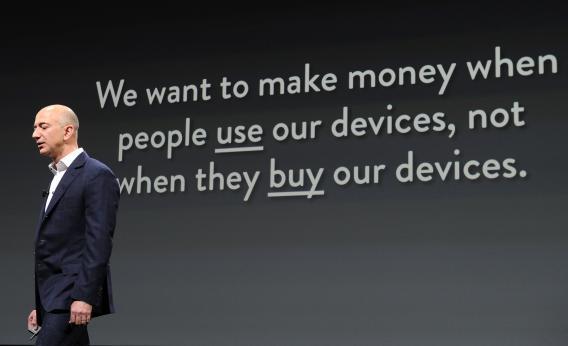Jay Goltz, proprietor of a small retail store, has hit upon e-commerce’s real threat to his business which he accurately says goes beyond economies of scale or even ability to avoid sales taxes. It’s impossible to make money competing with Amazon, he says, because Amazon itself isn’t making money:
Why would a company choose to operate without a profit? Because it wants to provide great value? Check. Because it wants everyone to love the brand? Check. Because it wants to gain market share? Check. Because it wants to put everyone else out of business, so that it can one day flick a switch to raise prices and make a fortune? CHECK!
Don’t believe me? Well, here is Jeff Bezos of Amazon, explaining why making a profit isn’t important. Of course, he doesn’t say he’s planning to raise prices after he puts a lot of people out of business, but let me translate something for you: Gaining market share by not taking a profit makes the most sense if you are planning to raise prices later when you have less competition.
True enough. And I’ve heard this theory from a number of people: Obviously Amazon can’t say that its plan is to obtain a monopoly over all retail in America and then hike prices, but that must be the real plan.
And maybe it is. But it’s hard to see how that plan would work. Part of the genius of the Internet is that it makes it much easier for brands to directly market their wares to people. It’s easy to see how Amazon might put Kmart out of business, but the only way for Amazon to put Samsung out of business would be to actually manufacture mobile phones and televisions. And if Amazon ever starts trying to charge outrageous markups on Samsung’s products, people would just buy directly from Samsung. Amazon would probably be more efficient at delivering things quickly, but then any price premium Amazon charges would be in effect an upcharge for fast delivery, not a monopoly rent. And most of the time delivery speed just isn’t that big a deal.
My guess is that Amazon’s growth-first strategy really is exactly what it looks like—a strategy to pursue growth first that shareholders tolerate because Jeff Bezos is executing it really well and he has a compelling vision. But “drive the competition out and then raise prices” is very much a meatspace business strategy. In a world where physical location doesn’t matter very much, it’s hard to see how you could pull it off. And even if you could pull it off, you’d still have to just assume that the Justice Department and the FTC would for some reason fail to enforce the antitrust laws.
